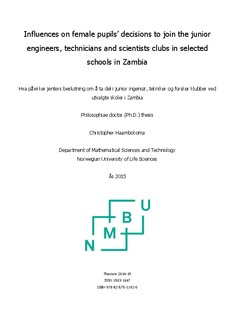| dc.description.abstract | A number of studies have been undertaken to establish why the participation of female pupils is low in science, mathematics and technology education. However, no studies have been done in Zambia to establish why some female pupils decide to engage in science, mathematics and technology-based extra-curricular activities such as the Junior Engineers, Technicians and Scientists (JETS) Club. The main purpose of this exploratory study was to understand what might have influenced some female pupils’ decision to join JETS Club when most female pupils avoid it. The study was located in the qualitative paradigm and was conducted in the Lusaka region of Zambia, at four schools. The researcher collected qualitative data from four different schools in order to get diverse perspectives and also to deepen his understanding of the issues under investigation. The study was guided by four research questions.
The target population consisted of female pupils in grades 10 to 12, and who were in JETS Club. The sample consisted of 48 JETS Club members (12 at each of the four participating schools), selected purposively in order to reach those who were regarded to have a good knowledge and experience of the issue under study. The researcher was of the view that this sample would give him enough data for the purposes of this study. Further information was also sought from teachers who had been working with JETS clubs to get their perspectives on the issue under study. Group interviews consisting of 12 participants were used to collect data from female pupils at each school in July 2010. Interview sessions were normally held in the afternoon, when participants did not have lessons. Data from teachers was collected using individual interviews, and the interviews were recorded and transcribed. The data was sorted out into categories using both the inductive and deductive approaches of generating categories.
A number of findings emerged from this study. With respect to what influenced female pupils to decide to participate in JETS clubs, the study found that they were motivated to join the club by six factors (or zones of influence , namely: personal, family members, peers, club members, teachers and the media. Of these influences, personal or internal influences were the most important factors determining the female pupils’ decision to participate JETS clubs. The study also found that personal influences were reinforced or supported by external influences, such as family members, peers, club members, teachers and the media..The study established that articipation in JETS Club activities had benefits for female pupils. These were acquisition of knowledge above what was normally gained during time-tabled lessons, as well as acquisition of skills and attitudes relevant to science, mathematics and technology studies. It also came to light that there were challenges experienced by female pupils participating in JETS Club activities. These included apportioning time between JETS activities and other activities, negative attitudes of some of the pupils in JETS club towards female pupils and inadequate support from JETS Club patrons. Among the factors which female pupils in JETS Club thought contributed to most female pupils avoiding to join JETS Club included the perception that JETS was a club for boys only, belief that JETS Club tasks were difficult, lack of self-confidence and non-science related aspirations.
One of the implications which emerged from this study is that it is important to deliberately encourage more female pupils to join JETS Club because participation in JETS activities is academically and socially beneficial to female pupils. Another implication arising from the findings is that activities aimed at increasing the number of female pupils participating in science and technology extra-curricular club activities should target female pupils, family members, peers, club members and teachers.
For further studies on this topic, interested researchers are advised to investigate why some brothers have negative attitudes towards their sisters’ decision to participate in JETS Club activities and why patrons did not provide adequate guidance to pupils in JETS Club when they were expected to do, so as well as what influenced male pupils to join JETS Club. | |
